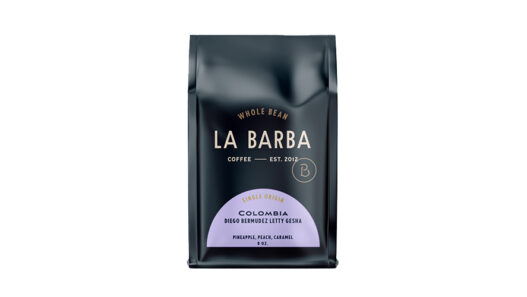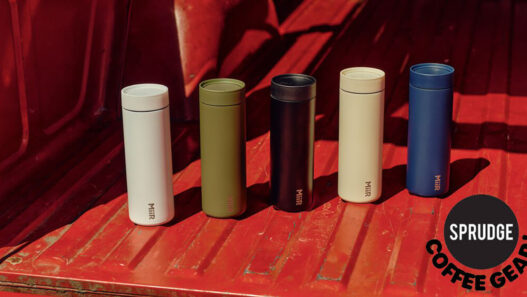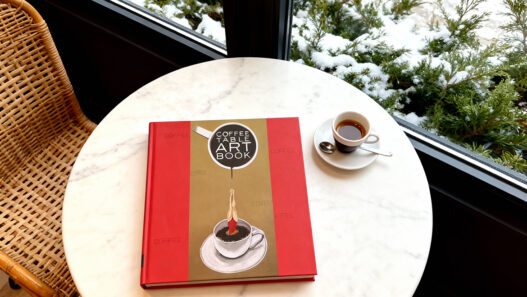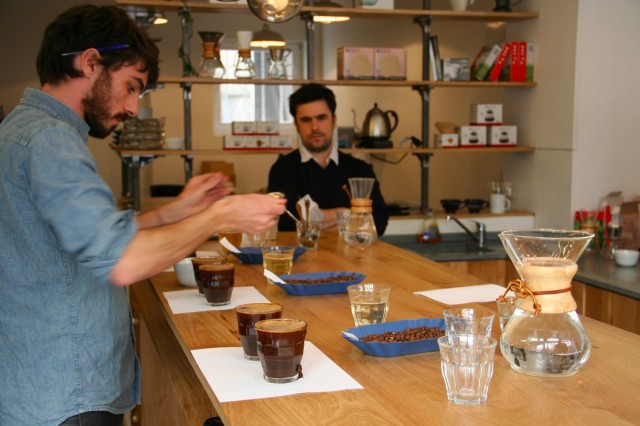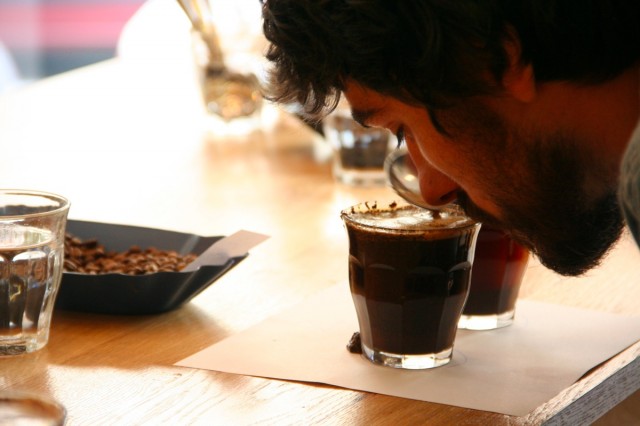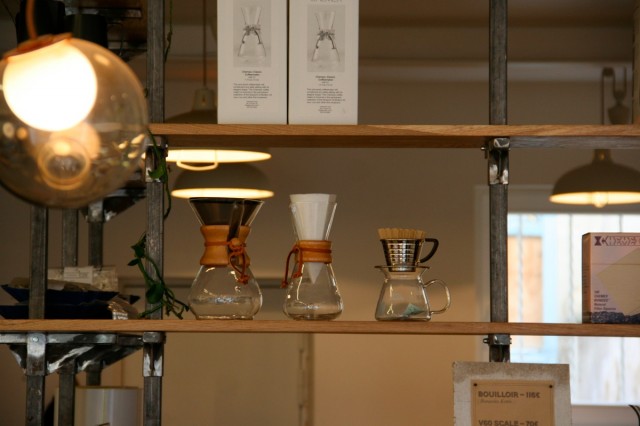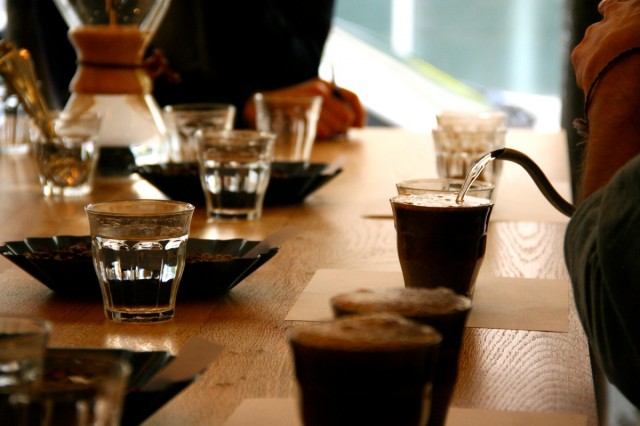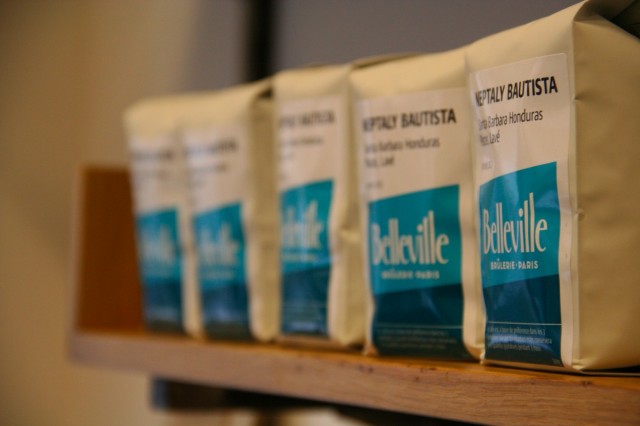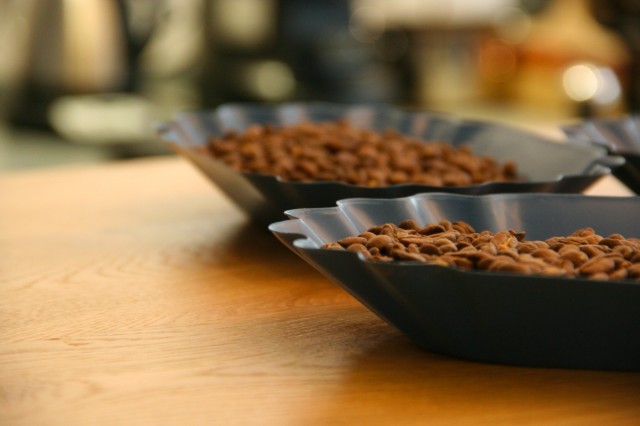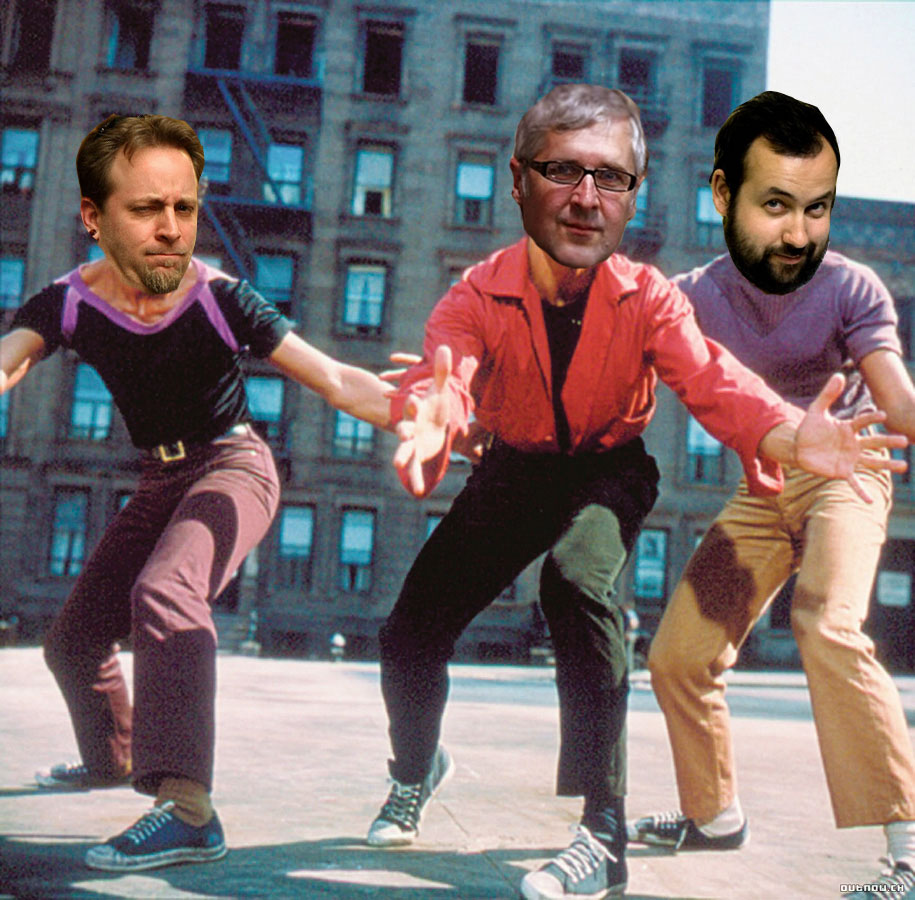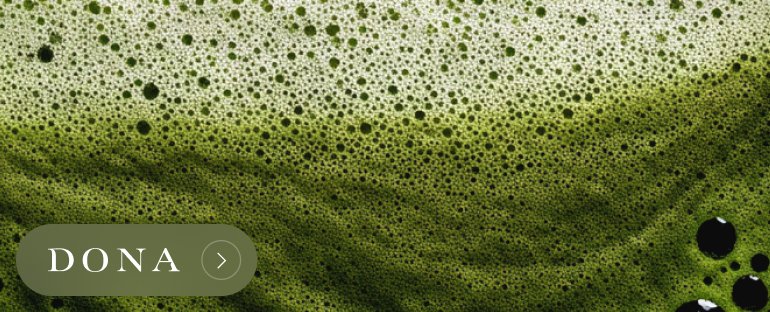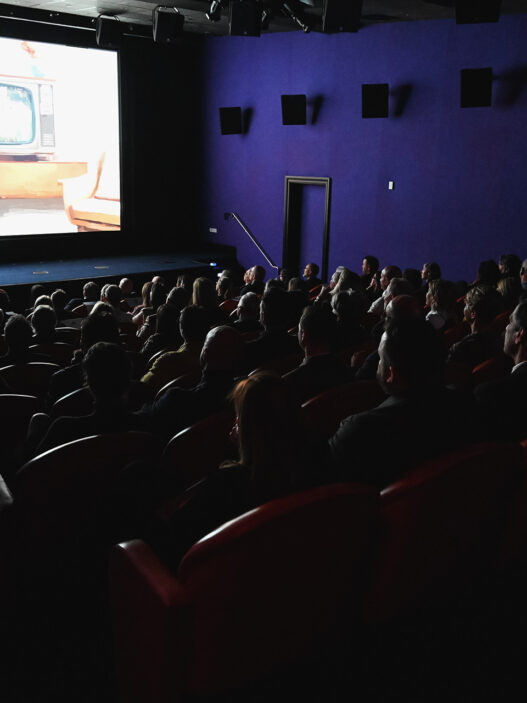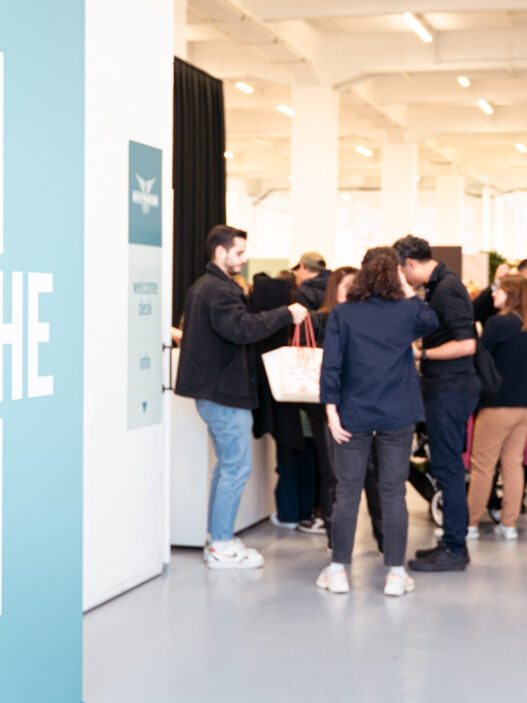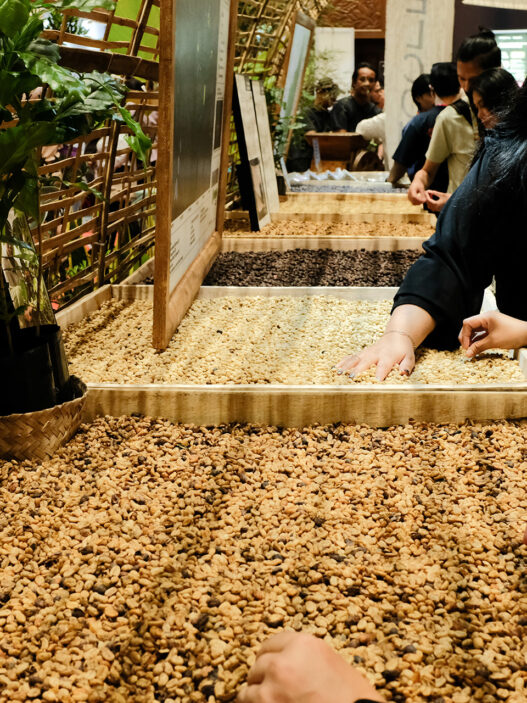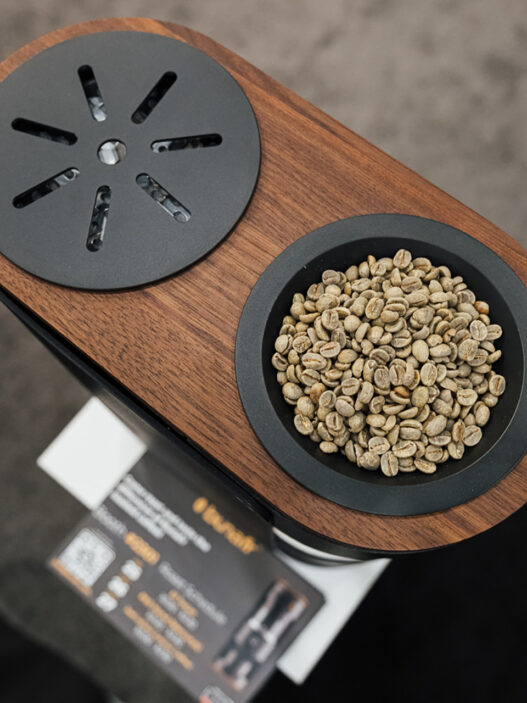It’s Saturday morning and I’m biking across Paris to get to a cupping at Belleville Brûlerie, a roaster that opened late last fall and is already supplying some of the most popular cafes around town. There’s a lot of talk about the growing coffee scene in Paris right now, and the guys behind Belleville are doing their best to make sure the movement really takes a firm hold, instead of remaining a mere trend. Starting with professional cuppings soon after opening last fall, now the cuppings have expanded to the public. Every Saturday morning at 11:30am you can make your way over to the 19th and have the Belleville team teach you all about coffee.
Today Thomas Lehoux, one of the owners of Belleville (along with Anselme Blayney and David Flynn) is running the show. The coffee world can get a bad name, leaving a bitter pretentious flavor in the mouths of many. But not here. Lehoux is quick to point out that this is a safe space for learning and exploring coffee. “There are no wrong answers. If you think it has a taste of grandmother’s ragout, then it has a taste of grandmother’s ragout,” he says, referring to the three coffees he has put in front of us.
He walks us through the cupping process, having us smell the grounds, explaining what ratio of beans to water he is using, and how we have to slurp up the coffee as forcefully as we can to experience the full burst of flavor. So that we fully understand how to properly taste coffee, he reminds us that coffee is “not like wine” and we shouldn’t hold it in our mouths for a long time. This is France after all, wine can never be far from a gastronomic discussion.
Throughout the process he encourages us to write down our impressions so we can talk about them afterwards. As he puts it, the goal is to have cuppings that are “un peu ludique.” Playful, so to say.
At the end he has us guess which countries the coffees come from and I surprise myself by at least getting the continents right. I feel like I have successfully spelled a ten-letter word at a spelling bee.
Lasting a little over an hour, give or take depending on how much the participants get going talking about coffee, the cuppings are free and open to the public. In February Belleville is adding in a class before the Saturday morning session, a place for people to learn more about coffee and how to make it–Belleville isn’t just a roaster, it’s a space for all sorts of coffee learning.
In fact, the space itself was made for teaching. The coffee roaster is in the back, and in the front is an open, boutique-like space, with a large table in the middle on which to brew plenty of coffee, and the surrounding shelves are packed with beans and coffee accoutrements. “It’s about creating a dialogue,” says Blayney, highlighting the importance of not just serving coffee to people but engaging them in a discussion about it. “That’s why we really wanted a space for tasting more than a coffeeshop.” While they’re happy to serve a coffee to inquisitive people that pass by, “we have a clientele we wouldn’t have if we were a coffee shop,” says Lehoux.
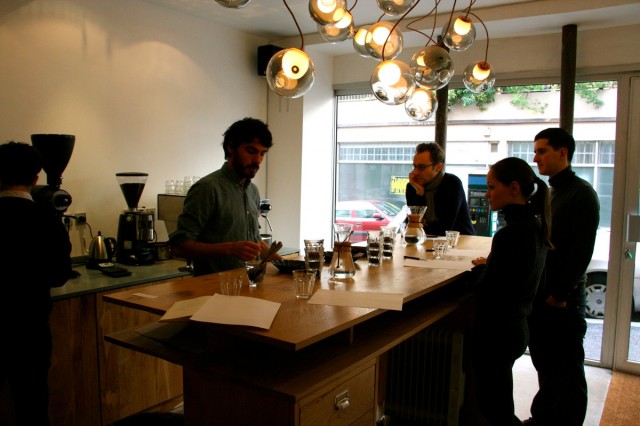
The roastery is named after the neighborhood it calls home. Belleville is an old working class neighborhood– you still get the feel that you could snag a relatively cheap artist loft around here. Sitting on a small, unassuming street with not much more around except for an old wine bar and restaurant on the corner, it’s not the kind of place you’d be exploring unless you lived in the neighborhood. But because the goal is to educate a wide swath of the general public on coffee, that has been a good thing for business.
Being open on Saturdays, Blayney points out that a lot of people come in on their way home from their morning market run. “They get a bag of coffee like they would get a baguette,” says Blayney. “To affect those [regular] habits, that’s really fantastic.” The day that craft coffee is as ubiquitous as the French baguette, Belleville will certainly know that they have succeeded.
And if customers are fueled by the idea of making good coffee in their apartment, this is the place to come. “You have everything in the boutique to make good coffee at home,” says Lehoux. It’s true. Beyond being just a roaster, Belleville is like a coffee outfitter, with all the beautifully designed specialty coffee products that you would ever want. Even if you already own a Chemex you’d be tempted to buy another.
We talk about the coffee trend that’s taking hold in Paris, and while these guys are well aware that they are a part of a burgeoning movement, they’re focused on building a business that works no matter what the trend. “We don’t want this to only be hype,” says Lehoux, using the English word that the French have commandeered to indicate anything trendy. “That’s why we push as much as possible the public tastings, open to anyone.”
But that public education doesn’t just stay within Paris. Thinking bigger picture, Belleville will soon be selling their coffee online, allowing them to reach more of the market in all of France. The goal is to expand further outside of the capital, and they’ve already started working with a few cafes in other cities like Lille and Lyon. The focus remains tres français however, which for the time being, is a market that is ready for the taking. “La France, la France, la France,” says Blayney for emphasis. The point is, they could sell their beans internationally, but they’d like their focus to be local, with “international” most likely limited to within Europe. After all, with many European capitals boasting strong coffee cultures, there’s lots of work to be done within the French borders.
Currently Belleville has about 20 cafes and restaurants that they work with around town, and even one client that’s doing filter coffee only, a good way of avoiding the investment of an expensive espresso machine. The perfect argument against anyone who says that serving good coffee isn’t worth the investment. Sometimes a Chemex is all you need.
And that brings us to the subject of filter coffee, or filtre as it’s called in French. Beyond the specialty cafes, you’re hard pressed to find it. This is a town of espresso, and the solution to a desire for a big cup of coffee is usually ordering an allongé. But within coffee lover circles here, filter coffee is having a bit of a comeback, and when you’re trying to get more people to drink good coffee, filter is a smart way to go.
“It’s always more complicated to drink a really good coffee in a restaurant,” says Lehoux, pointing out that because restaurants don’t specialize in coffee, it’s often not their main focus. “It’s depressing,” adds Blayney, “in Michelin starred restaurants, 75% is Nespresso.” But instead of trying to get restaurants to invest in an expensive, and time consuming, set up for espresso, the Belleville team has focused on filter coffee. “It’s a measure we’re trying to do, integrate filter coffees into [restaurant] menus,” says Blayney, “to have a gastronomic experience,” using a very French expression. After all, good wine, food and coffee should all go hand in hand.
But this too requires some work, because filter coffee doesn’t always have a good reputation. “In French people’s heads, it’s an ‘at home’ coffee,” says Lehoux, adding that, “for many French people it’s not a coffee for tasting, it’s a coffee of obligation in the morning.” In fact jus de chaussette – literally, “sock juice” – is a common French expression for weak or bad coffee, and often used to refer to bad filter coffee. Filter coffee “is the jus de chaussette, or ‘American coffee,’ the image of a coffeepot at a diner,” says Blayney. “We want to take that expression back and make it ours.” He adds, mixing French and English, “jus de chaussette is good for you.”
As it turns out, the local crowd is very willing to try new things. When they’re open on Saturdays, the Belleville team rarely serves an espresso.
Lehoux and Blayney make another wine reference, pointing out that once you’ve selected a good bottle of wine, you’re pretty much good to go once you sit down to serve it. Coffee is different in the sense that it’s not just the quality of the beans that are important, it’s how you make it. “A lot of things can go wrong,” says Blayney.
As we talk a French couple comes in to buy a bag of beans and Blayney explains to them the general bean to water ratio they should be shooting for. They smile and nod and go on their way, and you can tell the Belleville guys are happy knowing that they’ve gotten yet another person on the route to appreciating coffee as much as they do. While the coffee trend will grow the movement, it’s people like the team at Belleville, and interactions like these, that will ensure that it stays, inviting everyone, no matter what level of coffee experience, in for a taste.
Anna Brones (@annabrones) is the founder of Foodie Underground and the author of The Culinary Cyclist, with a cookbook due out next year from Ten Speed Press. Read more Anna Brones on Sprudge.




